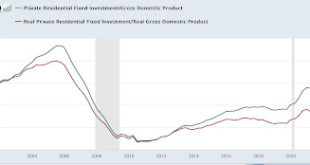In part two, Michael Hudson discusses his new book “The Collapse of Antiquity.” Hudson challenges the traditional beliefs about the fall of the Roman Empire, arguing that it was caused by a financial crisis brought on by excessive debt, wealth inequality, and the concentration of economic power. Hudson draws parallels to modern-day economies and highlights the dangers of financialization and wealth concentration....Michael Hudson — On Finance, Real Estate And The Powers Of...
Read More »Blog Archives
Leading components of Q1 GDP paint a mixed picture
Leading components of Q1 GDP paint a mixed picture – by New Deal democrat As you probably already know, real GDP increased 1.1% at a seasonally adjusted annualized rate in Q1. This doesn’t necessarily mean that the economy improved throughout the period. The median GDP for the quarter where post WW2 recessions have begun was +2.4%, and there are reasons to believe that the reason for the positive number in Q1 was big January gains. We’ll find...
Read More »US officials scramble to slow China’s advances — David P. Goldman
If you caan't beat 'em, sanction 'em..Asia Times US officials scramble to slow China’s advances David P. GoldmanSee alsoMoon of AlabamaU.S. Argues For More Protectionism And SubsidiesAlsoNaked CapitalismThe Rise of China (and the Fall of the U.S.?) Alfred McCoy, Fred Harvey Harrington Professor of History at the University of Wisconsin–Madison and author of To Govern the Globe: World Orders and Catastrophic Change. Originally published at TomDispatch
Read More »Democratic Liberty Versus Oligarchic Liberty
[unable to retrieve full-text content]Part 2: Debt and the Collapse of Antiquity – Michael Hudson Colin Bruce Anthes Welcome back to theAnalysis for part two of our conversation with Dr. Michael Hudson on The Collapse of Antiquity. Michael Hudson I think the character of early Christianity is what is in the Lord’s Prayer. “Forgive them their debts as we forgive the debtors.” Continue Reading The post Democratic Liberty Versus Oligarchic Liberty...
Read More »Lavoie on Inflation Theory: Conflicting claims versus the NAIRU
New Paper by Julia Braga and Franklin Serrano. From the abstract: The conflicting claims approach to the theory of inflation so thoroughly surveyed and well presented in Chapter 8 of Lavoie’s (2022) book is deservedly becoming increasingly consensual among heterodox (and even some notable mainstream) macroeconomists. However, the relevance of a concept (and the very existence of) a NAIRU (Non-Accelerating Inflation Rate of Unemployment) derived consistently from the very premises of the...
Read More »Spend your life accumulating assets.
Accumulating, good assets, and holding man should be the focus of your financial life. It will take care of you and generations after. 
Read More »Mike Norman Economics 2023-04-28 16:18:19
The “Demise of the Dollar” is a long-running story in hard money circles, and has gotten a recent push by the growth of transactions in the Chinese yuan in international transactions. Although it seems likely that the yuan will grow in importance, this is largely a nothingburger from the perspective of the United States.Emerging market investor Paul McNamara was recently interviewed by Tracy Alloway and Joe Weisenthal on this topic. His views are better thought out than mine, but I just want...
Read More »Argentine, peso, collapsing. Raise rates!!
The same garbage economics keeps being applied with the same garbage results. Insanity.
Read More »De-dollarization kicks into high gear — Pepe Escobar
De-dollarization is a process that Pepe Escobar sees as not only underway but also the inevitable outcome of Western overreach in the form of imposition of neoliberalism, neo-imperialism, and neocoloniztion through hybrid warfare including economic. Weaponizing the dollar pushed the Global South and East over the edge. In terms of the world system, de-dollarization can be viewed as an extension of decolonization, which is the real meaning of multipolarism, and which is being led by China and...
Read More »The market systems failure
The market systems failure
Read More » Heterodox
Heterodox




